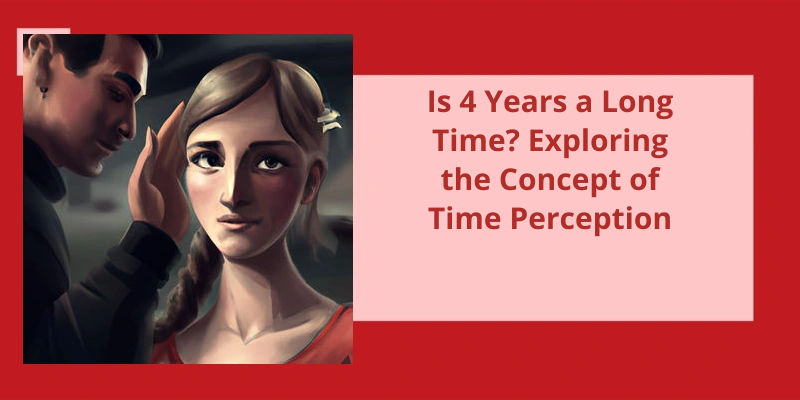The length of time is influenced by various factors like our experiences, emotions, and circumstances. At times, four years can seem like an eternity, whereas at other times, it can fly by in the blink of an eye. Considering the impact that time can have on us, it's understandable why people may wonder whether four years is a long time. This question can be approached from multiple angles, such as considering it in the context of relationships, careers, or personal growth. Ultimately, the answer will depend on our individual perspectives and what we hope to accomplish or achieve in the given period.
Is 5 Years Long or Short?
Many factors determine how long or short 5 years might be. In terms of personal growth, 5 years is a decent duration for noticeable changes in an individual. People finish their studies, start working, get married or have kids, relocate to a new place, or even start a business in 5 years. For anyone pursuing long-term goals, 5 years is enough time to make a certain level of progress.
However, from a business perspective, 5 years might seem quite short. Companies usually plan their strategies and investments for a longer period of time. A lot can change in 5 years, and businesses have to remain flexible enough to adapt to changing market trends, economic conditions, and consumer behaviors. In such scenarios, 5 years may not seem like a sufficient window to implement any significant changes or see substantial returns on investments.
When looking at history, 5 years seems like a blink of an eye. History is marked by significant events that span decades, centuries, or even millennia. However, five years can still make a notable difference in certain historical contexts. For instance, in politics, five years might be enough for a new government to introduce reforms and implement policies that can drastically change the course of a countrys history. Moreover, five years can also bring significant technological advancements or potentially transform societal norms.
However, no matter what ones perspective, five years is inevitably going to pass. It’s therefore essential to use the time to the best possible advantage and achieve the desired goals.
Relationships are complex, and there’s no fixed timeline for when two people should take their commitment to the next level. However, a recent survey by Bridebook has shed light on the average duration of courtship before getting engaged. According to the study, four years seem to be a comfortable time frame for couples to develop a strong bond and determine if they’re ready for a long-term commitment. But is that really the case? Let’s explore further.
Is 4 Years a Long Time to Date?
So, dating someone for four years can actually be seen as a long-term commitment towards ones partner. It’s a significant amount of time for two individuals to get to know each other and understand each others values, habits, and expectations. Moreover, it allows couples to go through different phases of a relationship, such as the honeymoon stage, the learning stage, the adjustment phase, and the growth period. These experiences can contribute to a stronger and more stable relationship.
However, it’s important to note that the length of a relationship doesn’t determine it’s quality or ultimate success. Some couples can be together for a decade and still not have a healthy relationship, while others can be together for a short period and have a fulfilling and loving connection. Therefore, instead of focusing on the duration of time spent dating, it’s more valuable to pay attention to the level of communication, mutual respect, and emotional connection between partners.
When it comes to relationships, time is just one factor that determines whether it’s long term or not. Two individuals can be together for a decade, yet lack the emotional depth and commitment that makes it a long-term bond. On the other hand, a couple who’s known each other for a few years may have built a strong and lasting connection that’s considered long-term. So, is two years considered long-term? Let’s explore this question further.
Is 2 Years Considered Long Term?
It’s important to note that the length of a relationship isn’t the most important factor in determining it’s strength and significance. While two years may be considered a significant amount of time for some couples, for others it may not be. The quality of the relationship, level of commitment, and depth of emotional connection are all more important factors to consider.
That being said, a relationship that’s lasted two years has likely encountered it’s fair share of challenges and obstacles. The couple has had time to get to know each other on a deeper level, and has likely experienced significant milestones together. This can include moving in together, meeting each others families, and celebrating major holidays and events. If the relationship has lasted this long, it’s a good sign that the individuals involved are willing to make a long-term commitment to each other.
However, it’s important to keep in mind that every relationship is unique, and what may work for one couple may not work for another. Some couples may be ready to make a lifetime commitment after only a few months, while others may need several years before deciding to take that step. It’s important to communicate openly and honestly with your partner about your feelings and expectations for the relationship.
A healthy and fulfilling relationship is built on mutual trust, respect, and communication, and can last for a lifetime if both partners are committed to nurturing and maintaining it. Whether your relationship has lasted two years or twenty, it’s always important to prioritize your partner and work together to build a strong and lasting bond.
The perception of time is a curious thing. It can vary greatly depending on our circumstances and experiences. While 2 years may not seem like much in the grand scheme of things, it can feel like an eternity when we’re going through a tough time. On the other hand, time can fly by when we’re enjoying ourselves. Let’s explore this concept further.
Is 2 Years a Very Long Time?
The perception of time is dependent on various factors, including age, mental state, environment, and personal experiences. For instance, children tend to perceive time differently from adults. Children often have longer days because they’re experiencing new things, while adults tend to have a more routine schedule, making their days seem shorter. Moreover, when people are engaged in activities they enjoy, time seems to fly by compared to when they’re not.
It’s important to note that two years can be a significant period, especially when it comes to milestones and achievements. For instance, in just two years, someone could learn a new language, graduate from college, start a successful business, or even change their lifestyle completely.
On the flip side, two years can also feel like a very long time when one is waiting for something to happen or recovering from a traumatic event. For example, two years can feel like forever when a loved one is sick and requires lengthy medical treatment. Similarly, two years of incarceration can feel like an eternity for someone in prison, especially if they’re wrongfully convicted.
In many cases, it’s not really the amount of time that feels long but rather the experience of waiting or going through a difficult situation. Sometimes, even a short time feels like an eternity when the situation is unpleasant. An individual waiting in line at the DMV for an hour can feel like it’s been a lifetime, while someone who’s having fun on vacation may find the trip flew by.
Ultimately, whether two years is a very long time or not depends on the context, perception and your state of mind. Time is a subjective experience, and it’s different for everyone. It’s important to remember that everyones experiences are valid, and what may seem like a short period for one person could be a long time for another.
The concept of time is subjective and varies from person to person. However, it’s generally agreed upon that a period of 20 years or more can be considered a long time. This is because a lot can change within that timeframe, with people transitioning through various stages of life. From childhood to adulthood, middle age to old age, the course of one’s life can be radically altered over the course of two decades or more.
What Is a Long Time in Years?
However, what may be a long time for one person may not be the same for another person. For instance, a person who’s lived a very long life might not perceive 20 years as a long time at all. On the other hand, a younger person may feel that 10 years is a considerable amount of time.
Moreover, what makes a time period “long” is subjective and can depend on the context in which it’s being used. For example, the concept of a “long wait” may be different for a person waiting in a queue at a grocery store versus a person waiting for several hours at a hospital for a loved one’s surgery to end.
Another factor that affects the perception of time is the nature of the experience within that time period. Time can seem to move slowly if someone is experiencing boredom or pain. Conversely, if someone is having a good time or is engaged in an exciting activity, time can seem to fly by very quickly.
It’s worth noting that time itself is a concept that’s difficult to define. To some extent, time is a human construct that we use to make sense of our lives and to organize our experiences. In this sense, whether a particular length of time is considered long or not is a matter of human perception.
The question of what’s a long time is further complicated by the fact that our experience of time changes as we age. A year can seem like a very long time for a child, but a relatively short time for an adult. At the same time, as we grow older, it’s natural to become more reflective about the passage of time and to appreciate the value of each passing year. In the grand scheme of things, the question of what’s a long time may not matter very much. What’s more important is making the most of every moment, whether it feels long or short.
How Can We Better Appreciate the Value of Time and Make the Most of It?
- Set clear goals and prioritize tasks accordingly
- Track how you’re spending your time and identify areas where you can improve
- Avoid multitasking and focus on one task at a time
- Eliminate distractions, such as social media and email notifications
- Take breaks to recharge and avoid burnout
- Practice time management techniques, such as the Pomodoro technique
- Delegate tasks when possible to free up time for more important responsibilities
- Learn to say no to requests that don’t align with your priorities
- Make time for self-reflection and self-care to maintain a healthy work-life balance
- Remember that time is a finite resource and use it wisely
Conclusion
Looking back on the past 4 years, it’s undeniable that a lot can happen in a relatively short period of time. But what’s perhaps more important than the length of time itself is what we do with it. In 4 years, we’ve the opportunity to learn new skills, explore new places, meet new people, and make meaningful contributions to our communities. Ultimately, the value of any given timeframe lies not in it’s duration, but rather in how we choose to use it. So whether 4 years feels long or short to you, remember that it’s entirely up to you to make the most of it.






